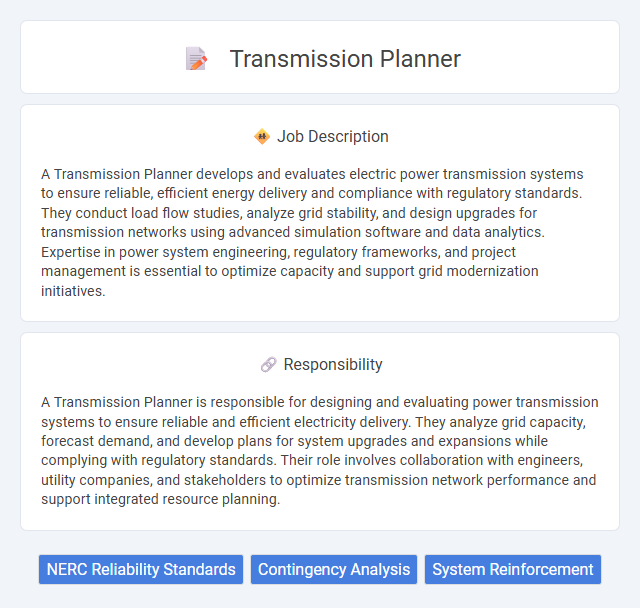
A Transmission Planner develops and evaluates electric power transmission systems to ensure reliable, efficient energy delivery and compliance with regulatory standards. They conduct load flow studies, analyze grid stability, and design upgrades for transmission networks using advanced simulation software and data analytics. Expertise in power system engineering, regulatory frameworks, and project management is essential to optimize capacity and support grid modernization initiatives.
Individuals with strong analytical skills and a passion for engineering are likely to be well-suited for a Transmission Planner role. Those comfortable with complex problem-solving and working in team environments probably find this job engaging and rewarding. People who prefer routine or minimal technical challenges may struggle to thrive in this dynamic and detail-oriented position.
Qualification
A Transmission Planner typically requires a bachelor's degree in electrical engineering, power systems, or a related field, with professional certifications such as PMP or PE highly valued. Expertise in power system analysis software, grid reliability standards, and regulatory compliance is essential for effective transmission planning. Strong analytical skills and experience with load forecasting, system modeling, and infrastructure development ensure successful project execution in this role.
Responsibility
A Transmission Planner is responsible for designing and evaluating power transmission systems to ensure reliable and efficient electricity delivery. They analyze grid capacity, forecast demand, and develop plans for system upgrades and expansions while complying with regulatory standards. Their role involves collaboration with engineers, utility companies, and stakeholders to optimize transmission network performance and support integrated resource planning.
Benefit
Transmission planners likely benefit from high job stability due to the critical nature of power grid infrastructure. They may experience competitive salaries and opportunities for career growth within the energy sector. The role often offers the chance to work on innovative projects related to renewable energy integration, enhancing professional development.
Challenge
Transmission planner roles likely involve addressing complex challenges related to optimizing power grid reliability and integrating renewable energy sources. Managing system constraints and forecasting future demand patterns may present significant difficulties requiring advanced analytical skills. The position probably demands balancing technical, regulatory, and financial considerations to ensure efficient transmission network development.
Career Advancement
A Transmission Planner plays a critical role in ensuring the reliable and efficient operation of electrical power systems by developing and optimizing transmission infrastructure plans. Career advancement in this field often involves progressing to senior engineering roles, project management positions, or specialized roles in grid reliability and smart grid technologies. Professionals with expertise in data analysis, regulatory compliance, and emerging energy technologies can leverage these skills for leadership opportunities and higher salaries within energy utilities and consulting firms.
Key Terms
NERC Reliability Standards
A Transmission Planner ensures the reliability and efficiency of the electrical transmission grid by conducting system studies and planning upgrades in compliance with NERC Reliability Standards. This role involves analyzing load forecasts, evaluating system contingencies, and coordinating with regional entities to maintain system stability and prevent outages. Expertise in NERC standards such as TPL (Transmission Planning) is essential to develop plans that meet regulatory requirements and support grid resilience.
Contingency Analysis
Transmission planners specialize in contingency analysis to assess the resilience of electrical power grids under various failure scenarios. They simulate potential outages or faults to identify vulnerabilities and ensure system reliability by recommending necessary infrastructure upgrades or operational adjustments. Their expertise in evaluating contingencies supports grid stability and prevents widespread blackouts.
System Reinforcement
A Transmission Planner specializing in System Reinforcement assesses existing power grid infrastructure to identify vulnerabilities and capacity limitations. They develop and implement strategic upgrades, including transmission line expansions and substation enhancements, to ensure grid reliability and accommodate increased load demands. Their role involves detailed load flow analysis, contingency planning, and coordination with regulatory agencies to support efficient and resilient energy transmission.
 kuljobs.com
kuljobs.com